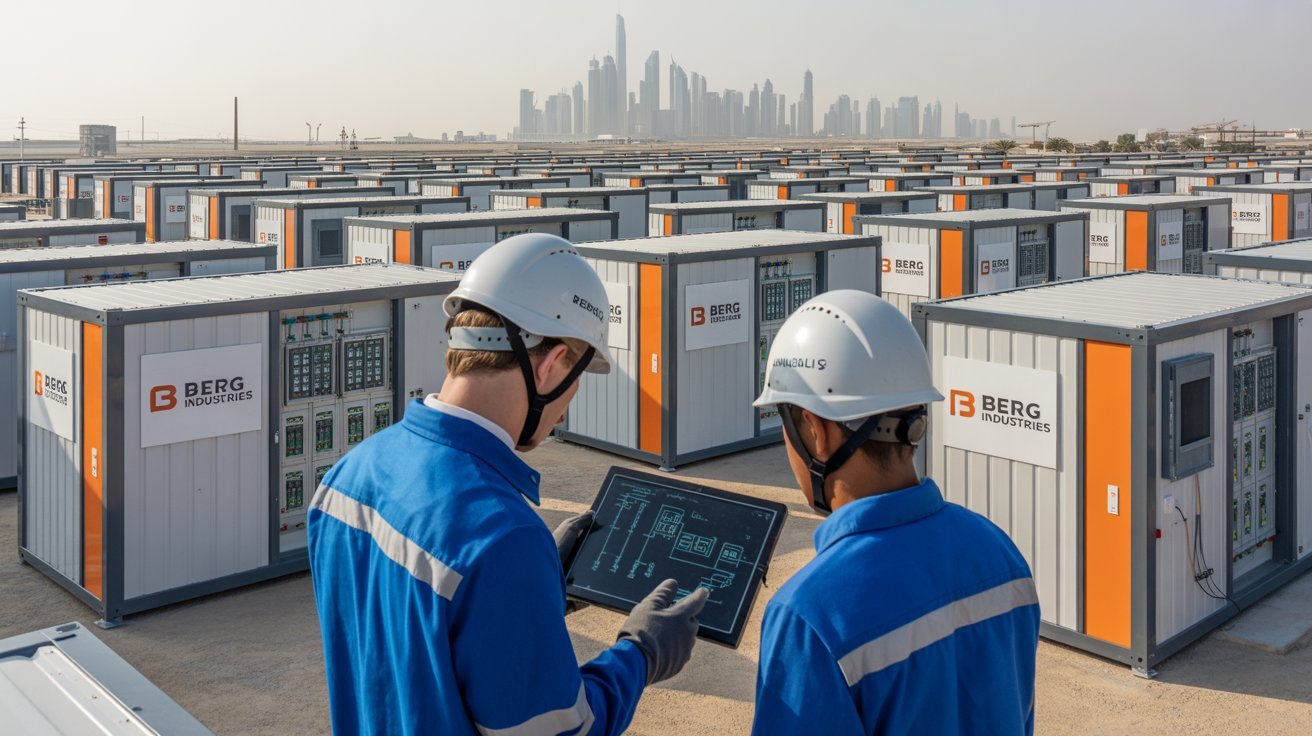Construction delays drain budgets. They frustrate teams. They cause bottlenecks nobody wants to deal with. When electrical equipment has to be housed in tough conditions, it becomes even harder to keep timelines on track. Heavy switchgear, transformers, and control panels aren’t exactly plug-and-play in concrete shells built in the middle of an active site.
So, the need for a faster, cleaner, safer approach has been growing. One that doesn’t rely on weather windows or multiple trades waiting for each other. In many projects, Modular Technical Buildings (E HOUSE) fill that need.
What Are Modular Technical Buildings (E-Houses)?
Modular Technical Buildings (E HOUSE) are pre-assembled, transportable buildings that contain electrical and mechanical systems. These include switchgear, protection relays, battery systems, fire alarms, and more. Their design allows for complex setups to be configured off-site, then transported and installed with minimal disruption.
Instead of waiting for walls to go up, cables to be routed, panels to be mounted, and everything to be tested one by one, these buildings are assembled in controlled workshops. Wiring, testing, and integration are done before they ever leave the facility. For companies handling projects across Dubai and Beirut, this method reduces downtime and smooths coordination.
The structure itself isn’t generic. Materials are selected based on the climate, equipment size, ventilation needs, and site restrictions. Some are blast-proof. Others are soundproof. Some need double insulation. The form depends entirely on function. That’s where technical & modular solutions make the difference, purpose-built, not just built.
Key Benefits of Modular E-House Solutions
For industries relying on electrical systems that can’t afford surprises, Modular Technical Buildings (E HOUSE) help keep things in check. The benefits go beyond convenience. They often help teams avoid multi-week delays and safety conflicts that can eat into delivery schedules.
The assembly is done off-site. That reduces risks on-site.
Faster Turnaround
Project milestones are easier to hit when multiple phases run in parallel. Site groundwork happens while the E-House is being assembled and tested. Less downtime between steps.
Safer Work Environment
A smaller footprint on-site means fewer clashes between teams. There’s less scaffolding, welding, or heavy lifting next to live systems.
Better Testing Conditions
Factory testing catches errors early. No last-minute fixes or exposed connections in unpredictable weather.
Controlled Quality
Skilled technicians use the same materials and tools, under the same conditions. That makes the build more consistent.
Simplified Logistics
Instead of multiple deliveries and trades over weeks, a single unit arrives nearly complete. Fewer moving parts during handover.
Adaptable for Growth
Need more capacity later? Add a second building or extend an existing one. Layouts can evolve with your plant.
Industries That Benefit from Modular Technical Buildings
Not every site is easy to build on. Some are far from cities. Others face tight regulations. In both Dubai and Beirut, modular buildings give teams a way to sidestep site obstacles. That’s part of why more industries are moving in this direction.
They don’t just work for one type of project. They adapt. They move if needed. And they help teams meet demands without redrawing site plans.
Power Generation and Transmission
Grid substations often need fast deployment and tested systems. E-Houses deliver switchgear, control rooms, and relay panels in days, not months.
Oil and Gas
Onshore and offshore platforms use modular buildings to house electrical equipment safely, especially in high-risk areas.
Renewables
Solar farms and wind parks rely on quick setup. E-Houses make it easier to manage inverters, SCADA systems, and battery banks.
Water and Wastewater Treatment
Pump stations and treatment plants benefit from having pre-integrated systems that install fast and stay protected from the elements.
Data and Telecom
E-Houses serve as shelters for servers, UPS systems, and cooling equipment in remote or urban telecom hubs.
Sustainability and Innovation in Modular Solutions
Modular isn’t just about speed. It’s also about building smarter. Every structure built in a factory generates less waste, uses materials more efficiently, and avoids repeated trips from suppliers. That’s better for the environment and easier on the supply chain.
Instead of breaking ground and leaving crews there for weeks, modular buildings reduce site activity. There’s less dust. Fewer emissions. And fewer disruptions for nearby communities. That matters in dense zones like Beirut or regulated areas across the UAE.
- Fewer trips to site mean lower emissions
- Reusable layouts and scalable designs reduce waste
- Tighter building envelopes reduce energy loss
- Safer disposal of packaging and by-products
- Controlled processes reduce errors and excess
Why Choose Berg Industries for Modular E-House Solutions?
Timelines matter. So does quality. With in-house design, engineering, and fabrication, Berg Industries reduces handovers that often lead to miscommunication and delay. From our locations in Dubai and beyond, we manufacture Skid Packages, Pressure Vessels, Fuel Oil Systems, and Modular Technical Buildings (E HOUSE) that meet project needs on time.
Each structure is built to match local code and project specs. We use weather-resistant materials, smart layouts, and a flexible production process to deliver repeatable results.
We don’t treat modular buildings as off-the-shelf boxes. Every system is tailored. Every wall, opening, and path for cable routing is planned.
Planning an industrial project in the UAE or Beirut? Let’s talk. We’ll help you find the right modular buildings manufacturer in UAE to build what your project needs.
Frequently Asked Questions
Can E-Houses include climate control systems?
Yes. HVAC, insulation, and ventilation systems are added based on local climate and heat load.
Are modular E-Houses permanent or temporary?
They can be both. Units can stay fixed or move depending on future needs.
Do modular buildings support automation systems?
Yes. Most designs include panels for PLCs, SCADA, and remote monitoring gear.
Is site civil work needed before E-House delivery?
Basic foundations and utility connections are needed. The rest is factory built.



